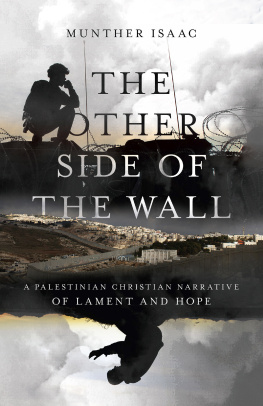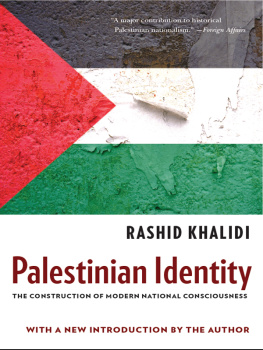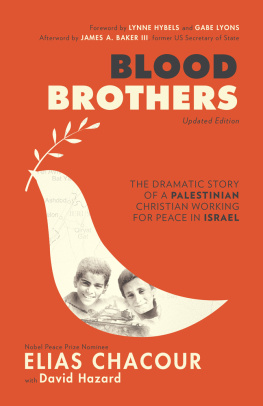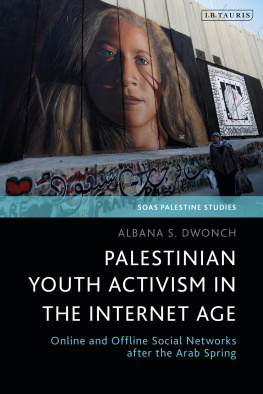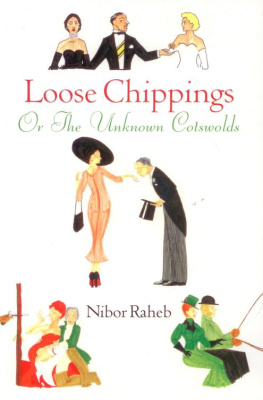Mitri Raheb - I Am a Palestinian Christian
Here you can read online Mitri Raheb - I Am a Palestinian Christian full text of the book (entire story) in english for free. Download pdf and epub, get meaning, cover and reviews about this ebook. year: 2008, genre: Religion. Description of the work, (preface) as well as reviews are available. Best literature library LitArk.com created for fans of good reading and offers a wide selection of genres:
Romance novel
Science fiction
Adventure
Detective
Science
History
Home and family
Prose
Art
Politics
Computer
Non-fiction
Religion
Business
Children
Humor
Choose a favorite category and find really read worthwhile books. Enjoy immersion in the world of imagination, feel the emotions of the characters or learn something new for yourself, make an fascinating discovery.
- Book:I Am a Palestinian Christian
- Author:
- Genre:
- Year:2008
- Rating:4 / 5
- Favourites:Add to favourites
- Your mark:
- 80
- 1
- 2
- 3
- 4
- 5
I Am a Palestinian Christian: summary, description and annotation
We offer to read an annotation, description, summary or preface (depends on what the author of the book "I Am a Palestinian Christian" wrote himself). If you haven't found the necessary information about the book — write in the comments, we will try to find it.
I Am a Palestinian Christian — read online for free the complete book (whole text) full work
Below is the text of the book, divided by pages. System saving the place of the last page read, allows you to conveniently read the book "I Am a Palestinian Christian" online for free, without having to search again every time where you left off. Put a bookmark, and you can go to the page where you finished reading at any time.
Font size:
Interval:
Bookmark:




PALESTINIAN
CHRISTIAN
Mitri Raheb
TRANSLATED BY Ruth C. L. Gritsch
WITH A FOREWORD BY
Rosemary Radford Ruether
vii
XI
PART ONE:
PART TWO:
APPENDICES 117
TO THE ONE WHOSE LOVE, ENCOURAGEMENT, AND SUPPORT MADE THIS WORK POSSIBLE: MY WIFE, NAJWA
MITRI RAHEB is a Palestinian Arab Lutheran Christian pastor who ministers in his hometown of Bethlehem. For many American Christians this combination of identities is incomprehensible.They assume that Palestinian Arabs are Muslims, not Christians, much less Lutherans. Their first question is likely to be, "When did you become a Christian?" assuming him to be a recent convert from Islam. Raheb writes as a cultural mediator to the Western Christian world and as a local theologian for the Palestinian Christian community.
Raheb wishes Western Christians to understand the Palestinian Christians' reality, of which they have been deeply ignorant and whom they have injured and betrayed in that ignorance. He also grapples with how Palestinian Christians can develop a local theology that can be both truthful and helpful in mediating the conflicts between Israel and Palestine and among Christianity, Judaism, and Islam. Both are conflicts in which religion, politics, and collective identity intertwine.
To the question, "When did you become a Christian?" Raheb, like all Palestinian Christians, would reply something like, "Sometime in the first to third centuries." Palestinian Christians, including those who today may be Lutherans, are not recent converts to Christianity from Islam but the remnant of the ancient Palestinian Christian community who were the religious majority in Palestine by the fourth century. In that time Bethlehem was entirely Christian. Palestinian Christians in Palestine today are survivors who remained steadfast in their faith and their land under thirteen centuries of Islamic rule and almost fifty years of Israeli rule.
Unlike Western Christians, Palestinian Christians have almost no experience being the ruling political group. Even in the Byzantine period, they often belonged to Christian groups not favored by the emperor. In the Islamic period that began in the seventh century, they became a dwindling minority, as many of their brethren became Muslims. Today their numbers in the Holy Land are diminishing under Israeli pressure to emigrate, to the point where they worry that the ancient Christian churches will be empty of local Christians.
Although Palestinian Christians have lived most of their history as a minority and today as a minority within an occupied and subjugated people, they have also been cultural mediators between majority peoples and cultures. In the Islamic centuries they mediated Greek culture to the Arabs. Today they mediate between the Islamic Arab world and the Christian West. Raheb's book is itself an expression of this work of mediation.
Palestinian Christians are themselves the heirs of the many historic Christian heritages, from the schisms of the fifth century to the divisions of the Reformation, all of which have affected the Palestinian Christian community, dividing and subdividing it. Raheb's ancestors were Greek Orthodox until the early twentieth century. They became Lutheran when his orphaned grandfather was taken to a German Lutheran school to be raised. To knit together their local Christian community, Palestinian Christians must be the most inclusive of ecumenists, including the Middle East Council of Churches, Old Catholics and Orthodox Catholics (Uniate and Roman), and all varieties of Protestants.
Palestinian Christians also reach beyond Christianity to envision an ecumenical kinship of the three Abrahamic faiths, Judaism, Christianity and Islam. As a Bethlehemite, Raheb grew up thinking of both David and Jesus as his local kin, as well as his religious ancestors. As a Palestinian he is an integral part of the Palestinian Arab community, the majority of which are Muslims. One of Mohammed's first wives was a Christian, and the Qur'an cannot be understood without recognizing its overlapping relationship with both Christianity and Judaism.
Christians were both tolerated by Islam as "people of the book" and marginalized as second-class groups within the Islamic superstate. This impelled Christians in the Islamic world to become a "modernizing" cultural elite, seeking to separate religion and state to create secular Arab nation-states where they could enjoy equal citizenship. But secular nationalism has not fulfilled its promise of equality and justice, and so Arab Christians are faced with Islamic fundamentalist movements that would reestablish Islamic states where shari a (Islamic law) would reign and Arab Christians, as well as other religious minorities, would be marginalized and perhaps even persecuted.
If Palestinian Christians stand in danger of being betrayed by their Muslim brothers, they also have been betrayed by their Western Christian co-religionists. Wishing to repent of their sins of anti-Semitism against Jews, which resulted in the Holocaust, Western Christians mythologize the state of Israel as a "sign of redemption" and a fulfillment of God's promise to the Jews, ignoring the injustice to the Palestinians. For the Palestinians and the Arab world generally, Zionists have been Western colonists who brought with them religious myths of election and divine promise of the land to displace the local inhabitants from their historic homeland.
For Palestinians the state of Israel has not meant redemption but catastrophe, which has led to progressive land confiscation, expulsion, and daily violation of their human rights. Western Christian collaboration with this violence to assuage their consciences toward Jews has made Palestinians pay the price of Western "repentance." Since this violence and oppression are justified by both Jews and Western Christians in the name of the Bible, this situation has thrown Palestinian Christians into a conflictive relation with their own Scripture. How can Palestinian Christians today read biblical ideas---concepts such as Israel as God's elect people, the promised land, and the Exodus from Egypt to the promised land-without seeing themselves as victims of God's redemptive actions on behalf of others against themselves?
Palestinian Christians today stand between a secular nationalism that has proven inadequate to the demands of justice and reconciliation between peoples, and Muslim and Jewish Zionist fundamentalisms that offer them no hope but only the threat of further oppression as a minority religious community in dominant Jewish or Islamic states. There is no Christian fundamentalism into which they can retreat to find a place for themselves in this conflict of religion and state. For many the solution has been immigration to the West.
Font size:
Interval:
Bookmark:
Similar books «I Am a Palestinian Christian»
Look at similar books to I Am a Palestinian Christian. We have selected literature similar in name and meaning in the hope of providing readers with more options to find new, interesting, not yet read works.
Discussion, reviews of the book I Am a Palestinian Christian and just readers' own opinions. Leave your comments, write what you think about the work, its meaning or the main characters. Specify what exactly you liked and what you didn't like, and why you think so.




